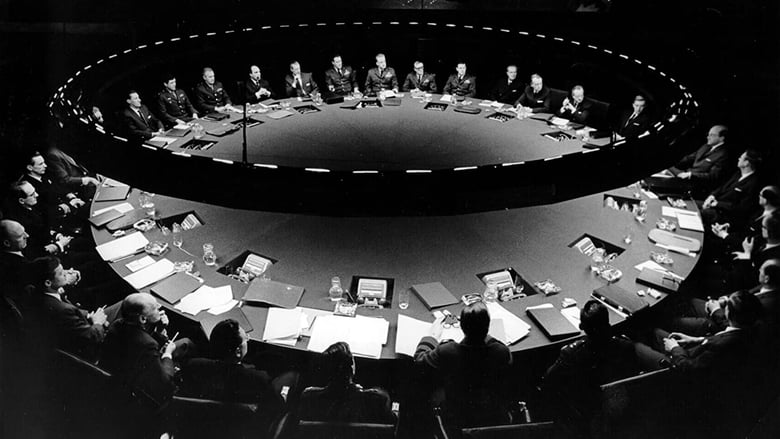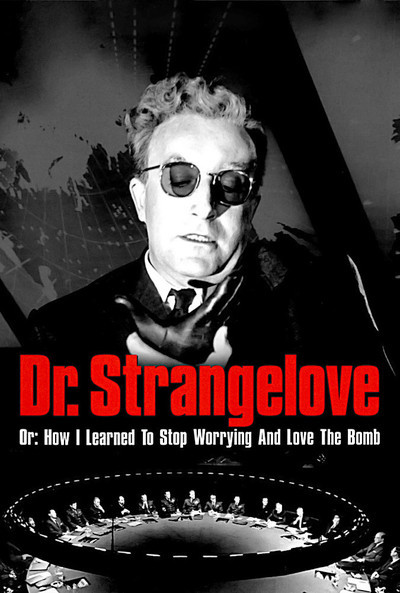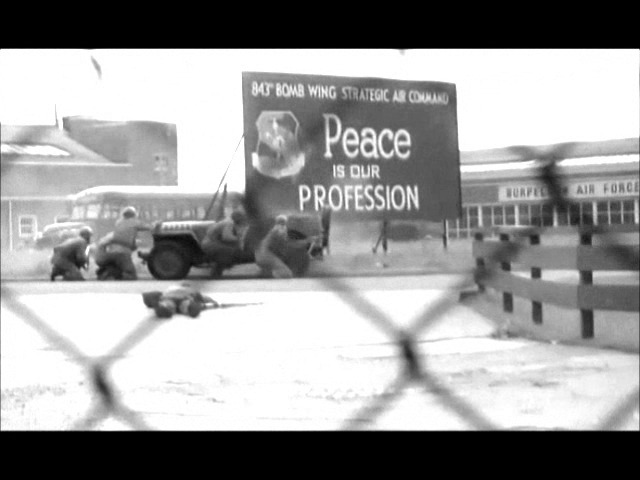← Back to Reviews

in
Dr. Strangelove or: How I Learned to Stop Worrying and Love the Bomb

A psychotic American general launches a nuclear attack on Russia during the Cold War, threatening the life of all mankind. His excuse? Bodily fluids.
This is the basic premise of Stanley Kubrick’s “Dr. Strangelove or: How I Learn to Stop Worrying and Love the Bomb”, arguably one of the most controversial and yet brilliant anti-war films of all time. It was shot in 1964, when the world was at the verge of a third World War, less than 20 years after Nazi Germany’s downfall. So, how did Kubrick manage to create a film where the possibility of nuclear Holocaust is faced with laughs instead of panic? Due to a brilliant use of irony.
From every character idiosyncrasy – an ex-Nazi scientist whose hand did not forget his past ideology; a patriotic American general who’s so proud of his pilots he forgets their success means the end of the word; a soldier who prefers to risk the national security to vandalize a Coca-Cola vending machine; the presidents of the two enemy countries talking by phone like two 15 year-olds madly in love, etc. – to every piece of dialogue like: “Gentlemen, you can’t fight in here – this is the War Room”, the movie is a giant and sarcastic critique to the hypocrisy of war and of those who think of themselves as being on the right side.
On top of all that we have a historic triple performance by Peter Sellers (Dr. Strangelove, Group Captain Mandrake and the President of USA) and remarkable performances by George C. Scott and Sterling Hayden.
Stanley Kubrick was a man that believed in the worse of every human being, his filmography tells us that. He knew that we tend to repeat the same mistakes over and over again. On the last scene we hear Vera Lynn singing “We’ll meet again”. Is there a more clear warning?

Dr. Strangelove or: How I Learned to Stop Worrying and Love the Bomb

--------------------
Year Of Release: 1964
Directed by: Stanley Kubrick
Screenplay by: Stanley Kubrick, Terry Southern and Peter George (based on the novel Red Alert by Peter George).
Cast: Peter Sellers, George C. Scott, Sterling Hayden, Keenan Wynn, Slim Pickens, Peter Bull, James Earl Jones and Tracy Reed.
--------------------
Year Of Release: 1964
Directed by: Stanley Kubrick
Screenplay by: Stanley Kubrick, Terry Southern and Peter George (based on the novel Red Alert by Peter George).
Cast: Peter Sellers, George C. Scott, Sterling Hayden, Keenan Wynn, Slim Pickens, Peter Bull, James Earl Jones and Tracy Reed.
--------------------
A psychotic American general launches a nuclear attack on Russia during the Cold War, threatening the life of all mankind. His excuse? Bodily fluids.
This is the basic premise of Stanley Kubrick’s “Dr. Strangelove or: How I Learn to Stop Worrying and Love the Bomb”, arguably one of the most controversial and yet brilliant anti-war films of all time. It was shot in 1964, when the world was at the verge of a third World War, less than 20 years after Nazi Germany’s downfall. So, how did Kubrick manage to create a film where the possibility of nuclear Holocaust is faced with laughs instead of panic? Due to a brilliant use of irony.
From every character idiosyncrasy – an ex-Nazi scientist whose hand did not forget his past ideology; a patriotic American general who’s so proud of his pilots he forgets their success means the end of the word; a soldier who prefers to risk the national security to vandalize a Coca-Cola vending machine; the presidents of the two enemy countries talking by phone like two 15 year-olds madly in love, etc. – to every piece of dialogue like: “Gentlemen, you can’t fight in here – this is the War Room”, the movie is a giant and sarcastic critique to the hypocrisy of war and of those who think of themselves as being on the right side.
On top of all that we have a historic triple performance by Peter Sellers (Dr. Strangelove, Group Captain Mandrake and the President of USA) and remarkable performances by George C. Scott and Sterling Hayden.
Stanley Kubrick was a man that believed in the worse of every human being, his filmography tells us that. He knew that we tend to repeat the same mistakes over and over again. On the last scene we hear Vera Lynn singing “We’ll meet again”. Is there a more clear warning?

